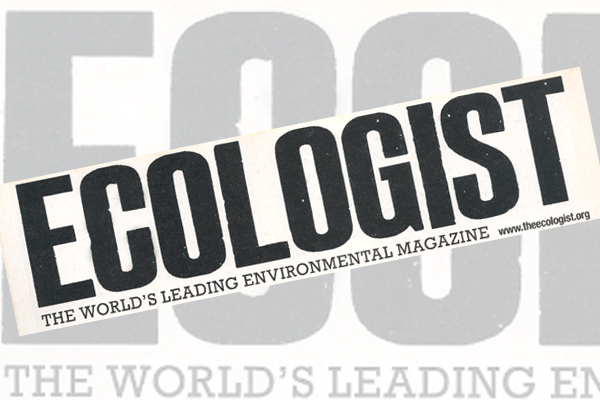The Monsanto Years – Neil Young Rocking for a Greener World

Celebrities have a unique ability to engage people in environmental campaigns, writes Pat Thomas. Neil Young is a case in point: his latest album, The Monsanto Years, conveys an eloquent message of the dangers of GMOs and corporate power, and his upcoming European tour offers green campaigners a unique opportunity to engage a broader public in the fight for a green future.
If you’re a campaigning NGO, your daily worry – apart from where the next tranche of funding will come from – is how to reach the widest number of people with your message.
Surveys suggest that we still have a long way to go to reach a place where the general public perceives environmental issues as urgent, or even connected.
One of the last major surveys into public attitudes found that many believe that health care, education and poverty are all more pressing – though it’s likely that too many are still unaware of how environmental degradation contributes to all of these things.
Most people are sympathetic – at least in a detached, intellectual way – to the need for things like sustainability, energy conservation, climate change mitigation, biodiversity, fair trade, and other green issues. But turning intellectual curiosity into a felt sense of urgency and then into action is a whole other challenge.
Celebrities to the rescue!
To provoke that sense of urgency many NGOs turn to celebrities for help. As a tactic it brings both positives and negatives. On the one hand celebrity involvement can de-politicise issues which are absolutely political. There is also the issue of follow-through; celebrities, unlike campaigners, have the luxury of picking up and putting down ’causes’ with ease.
On the other hand, our emotional connection to celebrity and fame can seed an emotional connection to the causes that celebrities find appealing. Our awe of celebrity can make us stand still just long enough to absorb the salient facts about environmental issues.
I’ve seen it happen myself. In 2009 when I was working as the Director of Paul McCartney’s Meat Free Monday campaign, we were lucky enough to be the main attraction at a special public hearing at the European Parliament under the title of Global Warming and Food Policy: Less Meat = Less Heat.
It was an impressive line-up of speakers that, in addition to Sir Paul, included Dr Rajendra K. Pachauri, Olivier de Schutter, Dr Alan Dangour and others. The event was streamed live to millions around the world and kicked off a conversation in the EU about meat, climate and sustainable diets that is still going on today.
Making a connection
What the public didn’t see was the surprisingly moving spectacle of what looked like the entire European Parliament staff lining the entranceway to see Paul arrive. Or the MEPs clutching their treasured vinyl copes of Rubber Soul and Sgt Pepper and offering them up hopefully for an autograph as Paul graciously worked the line.
That personal connection, that moment of authenticity was, I believe, influential in opening hearts and minds in the power capital of Europe, to a difficult but important issue.
I’ve seen something similar in the UK when I was working with Compassion in World Farming (CIWF), campaigning against the Nocton Dairies – the UK’s first proposed mega-dairy, in which the owners planned to cruelly raise 8,000 cows indoors all year round.
The Cows Belong in Fields campaign, which I was fortunate to be heading up, won CIWF the Observer Ethical Awards Campaigner of the Year Award 2011 – and we were lucky enough to have much loved comedian, birder, conservationist and author Bill Oddie support the campaign and accept the award with us.
Again, what the cameras didn’t see was, after the awards were all handed out, the lengthening queue of otherwise jaded journos who simply wanted to meet Bill, shake his hand and tell him how much he meant to them.
When, as editor of The Ecologist, I broke with 30 years of tradition and, for the first time, put a celebrity – Leonardo DiCaprio – on the cover in 2007 it was in acknowledgement of the fact that, in order to bring the issue of climate change to the fore, Leo had gone deeper than most, aligning himself as I reflected at the time with “the scientists, philosophers, activists and teachers on the front line. He’s chosen to be the channel through which their ideas can be amplified. He’s done it publicly and he’s done it with great panache.”
There are dozens of other examples out there of celebrity support that made a difference and what they show us is it’s not anger or banners or flags or even carefully crafted arguments that move us to action. Instead, it is our sense of connection, our capacity to touch and be touched by the courage of others we admire.
Rocking a greener world
Finding some equilibrium between the theatre of celebrity involvement and the long-term commitment of campaigning can be difficult. But over the last year Neil Young seems to have found a clever balance.
He is about to embark on European tour in support of his 2015 album The Monsanto Years and this years’ live album, Earth.
The Monsanto Years, in particular, is an album with a strong ecological and anti-corporate theme running through it and features songs exploring global hunger, pesticides, GMOs, seeds and ecology – all issues which Young says are close to his heart.
To underscore the themes of the album Young is bringing a full blown ‘Global Village’ of activists with him and providing an large platform for grassroots groups to reach out to people who are likely to be sympathetic to their causes, and maybe even moved to act, but who may not necessarily be attracted to joining causes, waving banners or joining marches.
The village of activists has already had a 25-city run in the US where diverse US-based groups occupied a series of tents focussing on themes such as GMOs, Earth Ecology, Energy & Climate, Freedom & Justice, the Future of Farming, and News You Can Trust.
According to Young: “The Monsanto Years are here and we are living them. Monsanto is the poster-child for what is wrong with corporate controlled government in our world. The Monsanto Years encompasses several associated subjects that millions of people worldwide are concerned about and active in. Earth is not ours. We are of the Earth. That’s how I feel. When we plunder our own home we hurt our children and their children after them. I feel responsible.”
It’s this sense of responsibility which has promoted the singer to involve EU groups like ours, Beyond GM, and help them get on the road with their messages.
On farmers and fame
Neil Young has a long history of activism and is no stranger to speaking out when he feels something is wrong.
Throughout his career the Canadian rocker – who is amongst only a few who have been inducted into the Rock & Roll Hall of fame twice – has used his music and fame to shine a light on political and environmental issues that are close to his heart.
He’s protested the tar sands projects in Canada, stood up for the rights of indigenous peoples in Canada, and initiated a boycott of Starbucks until they stop supporting Monsanto’s bid to block GMO labelling.
His song ‘Ohio’ – written during his time with Crosby, Stills, Nash & Young – remains a blunt and devastating condemnation of the massacre, by police, of four students at Ohio State University in 1970, and is widely regarded as one of the great rock protest songs of all time.
Of all the issues explored on The Monsanto Years, the theme of sustainable farming and GMOs is the one that surfaces the most often. Arguably, as a co-founder (with singers Willie Nelson, John Mellencamp and Dave Matthews) of the US charity Farm Aid, which supports small and family farmers, it is the one closest to his heart.
Young is a strong supporter of GMO labelling and, during the US tour, publicly pledged $100,000 to the Vermont State’s legal fund to help fight the corporate interests which were trying to prevent the state from enacting a law requiring all GMO-containing foods to be labelled
“I support those bringing these issues to light and those who fight for their rights like freedom of choice. But freedom of choice is meaningless without knowledge. That’s why it’s crucial we all get engaged and get informed.”
Commitment to change
While it is easy to be cynical about celebrity involvement in ’causes’ the Global Village represents a distinct commitment to helping others get their message out.
Don’t get me wrong; I’m not dewy-eyed about celebrity. But, as someone who has worked both in the music industry and in activism, I know that the synergy, when it works, can be spectacular.
Music by itself doesn’t change anything – any more than a well written press release or leaflet by a well-informed activist will. But delivered, as it so often is, by charismatic, committed and creative artists, it has a unique ability to turn up the volume on social and political issues to the point where they are impossible to ignore.
Outspoken musicians like Neil Young are plugged in to the current desire, and urgent need, for cultural change. They can bypass a corporate media that is fearful of challenging the status quo, and put important issues like agricultural GMOs in front of the public and encourage them to turn the message into action.
Campaigners are leaders
Today, perhaps more than ever, I believe that the work that we do as NGOs and as individual campaigners is not a luxury, it’s a necessity. Every day we are confronted with examples of the inadequacies of Government, the marketplace, the economy and legal systems – and campaigners help to address these inadequacies and put them into context, and also provide some essential checks and balances in society.
It is both rare, and welcome, to get a generous hand up in this difficult work.
Campaigners take on challenges that the public and private sectors simply can’t or won’t. We can take risks and think thoughts that are economically unacceptable to business and politically unacceptable to government, and which often go unremarked in the media. And some of that leading edge thinking can eventually form the basis of cultural and political reform – though this can be a long journey.
What all this implies is that, in spite of the near continuous stream of put downs from the ‘other side’, (most of which involve inane comments about hair shirts, green blobs and Luddites) and whether they know it or not, those who choose to speak out occupy a position of real leadership.
With that comes a responsibility to exemplify the qualities of leaders. To understand your audience, to be informed, persuasive, diligent, honest, creative, open-minded and accountable. To be seen, to keep reaching up and out and to find new ways to tell the stories that matter.
If that means getting on the road – as opposed to tweeting to the usual suspects, arguing the toss in the Guardian’s comment section, or sitting across the desk from yet another group of uninterested civil servants, then count me in.
To paraphrase Woody Allen, success belongs to those who show up. We’ll be there – along with several other important NGO partners throughout the UK and the rest of Europe. We hope you will too.
This article was first published by the Ecologist












